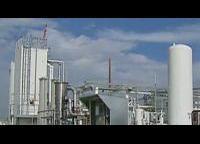One of the industry’s first renewable landfill gas to electricity plants was built at the Altamont in 1987. Today, it generates enough electricity to power the equivalent of 8,000 homes annually as well the daily operation of the Altamont’s acclaimed landfill gas to liquefied natural gas (LNG) plant.
The largest facility of its kind, the LNG plant is designed to produce up to 13,000 gallons of clean-burning natural gas daily – enough to power nearly 300 Waste Management collection vehicles in California a day. Our fleet of transfer trucks that travel between the Davis Street Transfer Station and the landfill are fueled exclusively with renewable LNG. Use of this near-zero carbon fuel eliminates nearly 30,000 tons of carbon dioxide emissions annually and displaces 2.5 million gallons of fossil fuels.
Landfill gas is created naturally by the decay of organic materials in a landfill. It is also a potent greenhouse gas, comprised of 50% methane and 50% carbon dioxide and other gases. The Altamont features a state-of-the-art vacuum extraction system and network of wells to capture the gas, convert it to renewable energy, and flare any residue to prevent it from entering the atmosphere.
Without adding another morsel of organic waste to the Altamont Landfill, it is estimated the renewable energy plants will operate for 30 years. Waste Management continues to explore and invest in new renewable technology to manage historic waste streams.

